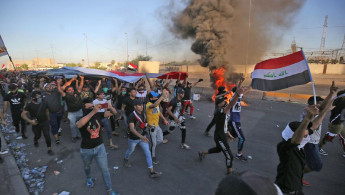Iran re-opens Iraqi border amid violent protests
The border post at Khosravi was reopened in the morning and "a group of Arbaeen pilgrims headed towards Iraq's holy shrines", said Jafar Hemmati, who heads a committee dealing with the annual commemoration event in Kermanshah province.
It had been closed on Thursday due to "problems in Iraq and at the request of the Iraqi authorities," semi-official news agency ISNA reported.
Iranians are among millions heading to the Iraqi holy city of Karbala for an annual pilgrimage that will culminate on October 17 with the Arbaeen commemoration.
Arbaeen is one of the world's biggest religious gatherings and marks the end of the 40-day mourning period for the seventh-century killing of the grandson of the Prophet Mohammed, Hussain ibn Ali, by the forces of Yazid.
Around 1.8 million Iranians made the Arbaeen pilgrimage last year, according to official figures, adding to nearly 12 million that visited Karbala from around the world.
Meanwhile, thirteen protesters were killed on Sunday in clashes in the Iraqi capital between protesters and security forces, medics and security sources said.
More than 100 people have been killed in Iraq since clashes erupted last week between protesters and security forces, the majority of them demonstrators struck by bullets.
The Iraqi authorities have accused "saboteurs" and unidentified snipers of targeting the protesters.
The protests follow Iraq's declaration of victory over the Islamic State group at the end of 2017 - after nearly four decades of conflict.
Starting Tuesday, protesters gathered in Baghdad and spread to the country's Shia-majority south, defying an internet blackout, tear gas and even live rounds.
The mainly male, young crowds say they are not backed by any political or religious establishment and have attacked a broad range of political party offices.





 Follow the Middle East's top stories in English at The New Arab on Google News
Follow the Middle East's top stories in English at The New Arab on Google News
![Israeli forces ordered bombed Gaza's Jabalia, ordering residents to leave [Getty]](/sites/default/files/styles/image_330x185/public/2176418030.jpeg?h=a5f2f23a&itok=_YGZaP1z)

